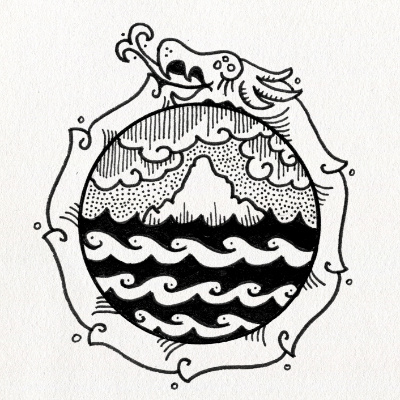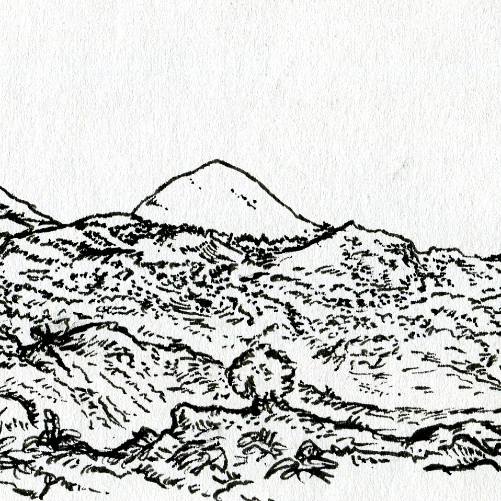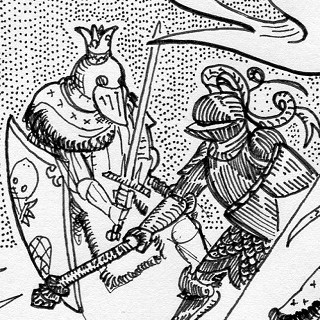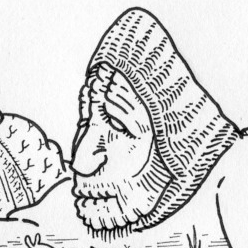
“The Song of Bos.”
Geef ons eten & drinken & een lang lied met een mooi verhaal.
Stories & Fables – the song of Bos, Berg & Dal*
The included document is to be read clockwise, starting from top left.
I. The Prester & the Pirates
AT THE START of a long-forgotten spring, pirates came in from the sea and sailed upstream on the river Geul.
They made landfall to pillage a town of weavers and spinners to take what they deemed theirs. Savage & ravenous, they tore down hovels and skewered villagers. The victims fled along the stream and found refuge at the house of Prester Teneynde†, a man who spent his life under Kwynte, the vow of silence.
The assailants followed and came to the house. Their violent stances and barking shouts were met with the stoic finesse of Teneyndes Handdesprauek‡. In complacent fashion and with eloquent gestures he bade them to calm their fury, gather their spoils, and make their way back to the ships. The cruel pirates, hailing from the great western Island, had never seen these mysterious signs. Steeped in superstitions and harmful beliefs they took the Prester for a man of occult power. They quivered and shook and made warding signs; noone dared approach the Silent man. They did not extend this courtesy to the wretched townsfolk.
When the ships continued their slither along the stream, and the groaning and crying ended, Prester Teneynde knew true Silence.
II. Old Man Clauweloos
“Old Man Clauweloos* drudged on the fields
His flax filled the plains and the valleys of old
He sowed and he reaped and he sang a song
The harvest was plenty but ’twas not enough”
“Old man Clauweloos cut down the trees
Scythed the hills, and spread out more seeds
He sowed and he reaped and he sang a song.
The harvest was wealthy but ’twas not enough.”
“Old man Clauweloos emptied the seas
brought down the mountains and plowed all the world
He sowed and he reaped and he sang a song.
The harvest was endless and now ’twas enough.”
Throughout the night, and sometimes by day,
look up to the sky and witness his farm.
When Clauweloos sows, the harvest grows,
and within two weeks his fields overflow.
He picks up his scythe to toil day and night,
and within two weeks he can sow anew.
III. Decklep & Katzenfloeperd
One midsummer afternoon Decklep the GrootmuylΔ
sat on his porch by his house in a tree.
He jumped and flopped and got on a branch,
dove in the pond way down, did he.
He swirled and he swam and he had a good time,
he came to the surface and what did he see?
That jolly quick feline, fuzzy with grime,
Katzenfloeperd, that tomcat of glee.
Decklep was tired, and the tree did seem high.
He asked Katz for help, to the porch bring him nigh.
Katz, wily stalker, proposed with vile thought:
“grab onto the hook and ascend by the string”.
and fish did grab on and lo he was caught!
For sharp cruel hook to his lips did cling.
One midsummer evening Katzenfloeperd
sat under a porch by a house in a tree.
He laughed and he sang
and ate the fat fish he outsmarted, did he.
IV. Rýnneert Vos
Reynaerd the Fox, the cornered rat, the ever opressed.
Many tales of him are told.
Others have written of Reynaert◊ and his brothers in ways I can not.
V. The Yolk
At dawn the farmer fed rye to his Kampkieken×.
They plowed and dug, so the field lay anew.
At noon the farmers wife fed yeast to the Kampkieken.
They watered the fields to be fertile once more.
At dusk the farmers daughter fed apples to the Kampkieken.
They turned in to bed, and savored the day.
At night the Kieken grew, and swelled
and had a small fright; it popped out an egg the size of the moon!
The farmer was overjoyed and wanted to haul it,
he slipped and he stumbled and the egg it fell down.
From that yolk came all creatures that you and I can see.
VI. Dinsternisse & Heetesonne°
HIGH ABOVE THIS WORLD there is a fortress, with moat and gate and towers broad. In front of its walls an endless duel is fought, repeated for eternity. One lives, the other dies, for all time to come.
It goes like this:
DINSTERNISSE STRINGS HER BOW and crafts three arrows called Ugtend, Noen & Aavont*. She takes position facing the gate from which her adversary will soon emerge.
Slowly, the gate is drawn, and thus appears Heetesonne, clad in the brightest armor. He strides forward, his lance loosely in hand.
Dinsternisse aims and fires Ugtend; the charging knight evades but his helmet is split in twain! Both halves end up in the moat. Again, Dusternisse shoots. Heetesonne braces his shield but Noen shatters it to pieces. Flying all about, they too fall into the moat. Lastly, she nocks Aavont, raises her bow once more, and lets loose that final, dreaded spike. Greedily, Aavont bores itself in Heetesonnes mouth and the paragon of Light drops to his knees. With a dry sound he collapses and is carried away by the waters of that same moat.
HE COMES TO in the fountain that graces the fortress’ main square. His armaments, now restored, lie by his side. Soon he will open the gate and charge her again. Because he must.
Notes
These stories are part of a long oral tradition and are not necessarily to be seen as literal truth.
In Bos, these are but few of a great many.
The caption reads:
“Give Us food & drink & a long song with a beautiful story. Tales & Fables – the song of Forest, Mountain & Vale”
(Written in plain Dutch, I thought it fit best.)
Prester — meaning Priest, Devotee; one who lives to certain tenets. Individuals with a special connection to the world.
Teneynde — from Dutch (ten einde) ‘at the end’, ‘at its end’ or even ‘in order to’.
Kwynte — Vow of Silence; either as penance or as part of a meditative lifestyle.
From Dutch (kwijnen, wegkwijnen) ‘to wither’.
Handdesprauek — Hand-Speak; the language of those who can not (or must not) be heard.
Also popular among in certain secretive societies.
Clauweloos — meaning Clawless.
Grootmuyl — Bigmouth; type of fish known for its tendency to nibble and bite at everything.
Reynaert — see the Wikipedia page.
Kampkieken — hot-tempered flightless birds with an appetite for apples, yeast and rye.
Dinsternisse — meaning Darkness.
Heetesonne — Heat of the Sun; his shield is called Decksel (‘English: ‘lid’).
Ugtend, Noen & Aavont — meaning Morning, Midday & Evening.






